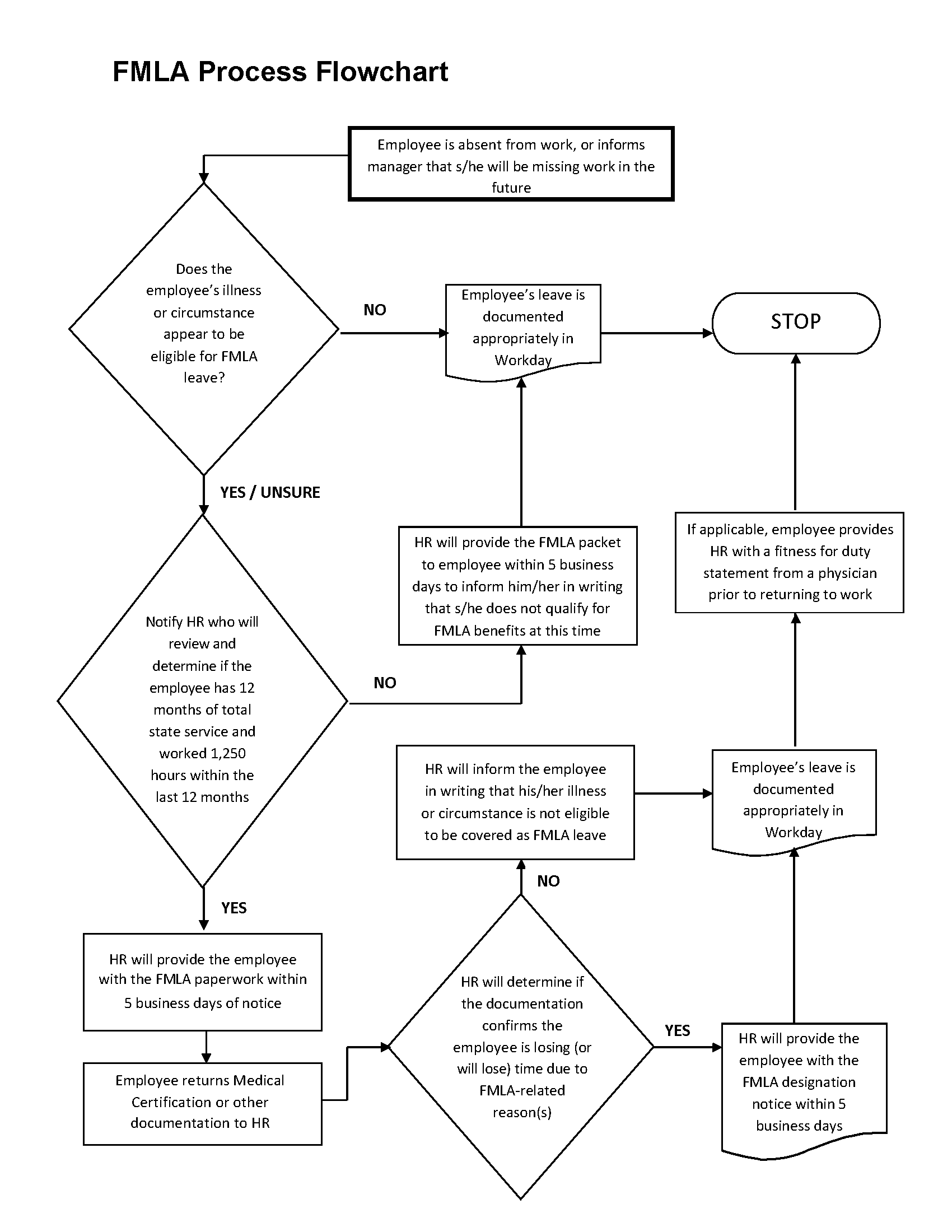Family and Medical Leave Act (FMLA)
Family and Medical Leave Act (FMLA)
The Family and Medical Leave Act (FMLA) is a federal law that provides eligible employees with unpaid, job-protected leave, which may be used in conjunction with paid leave, for specified family and medical reasons. Eligible employees may take up to 12 workweeks of leave per fiscal year for one or more of the following reasons:
- The birth of a son or daughter or placement of a son or daughter with the employee for adoption or foster care, and to bond with the newborn or newly-placed child;
- To care for a spouse, son, daughter, or parent who has a serious health condition, including incapacity due to pregnancy and for prenatal medical care;
- For a serious health condition that makes the employee unable to perform the essential functions of his or her job, including incapacity due to pregnancy and for prenatal medical care; or
- For any qualifying exigency arising out of the fact that a spouse, son, daughter, or parent is a military member on covered active duty or call to covered active duty status.
An eligible employee may also take up to 26 workweeks of leave during a single 12-month period to care for a covered servicemember with a serious injury or illness when the employee is the spouse, son, daughter, parent, or next of kin of the servicemember. An eligible employee is limited to a combined total of 26 workweeks of leave for any FMLA-qualifying reasons during the single 12-month period.
In addition to providing eligible employees an entitlement to leave, the FMLA requires that employers maintain employees’ health benefits during leave and restore employees to their same or an equivalent job after leave.
Employee Responsibilities under FMLA
Employees have certain responsibilities to fulfill if the leave taken is to be granted or designated as FMLA leave. In general, employees must:
- Provide 30 days’ advance notice of the need to take FMLA leave when the need for leave is foreseeable;
- Provide sufficient information (usually a certification form provided by HR) in a timely manner so that Human Resources may review for FMLA eligibility;
- Inform the department if the requested leave is for a reason for which FMLA leave was previously taken or certified;
- Provide re-certification of condition if requested; and
- Maintain appropriate contact with your department regarding your return-to-work status.
An employee’s failure to provide information in a timely manner may result in the delay or denial of FMLA leave.
Supervisor Responsibilities under FMLA
Supervisors are an important first step in the FMLA leave process. Specifically, supervisors will need to notify Human Resources when an employee’s absence triggers a potential need for FMLA leave. This need could be evident when an employee:
- Notifies the supervisor of their own or a spousal pregnancy, that his/her family will be adopting a child, or that the family will be receiving a child from foster care;
- Misses more than 3 (three) continuous days of work;
- Misses work due to a chronic health condition (e.g. diabetes, migraine headaches, etc.);
- Is placed in a hospital or day care facility for any length of time; and/or
- Is needing to care for a covered member of the armed forces, or is having to be absent from work due to a covered member being called to active duty.
Remember that the triggers listed above will include an employee’s missing work to care for a child, spouse, or parent suffering from a serious health condition. Human Resources must be notified immediately if any one of the instances listed above occurs so that the leave can be reviewed for FMLA eligibility. FMLA law mandates that we act in a timely manner after one of the triggers above has become evident. Employees should be encouraged to submit medical documentation directly to Human Resources.
Important Deadline Requirements and Processing Information
- Eligibility, Rights and Responsibilities notice: Human Resources must provide notice to an employee within five (5) business days regarding his/her eligibility (or non-eligibility) for FMLA leave when a department acquires knowledge that the employee’s leave may be for an FMLA-qualifying reason.
- Delay or denial of FMLA leave: Reasons for delaying or denying FMLA coverage include, among others, an employee’s failure to:
- Return appropriate certification within the 15-day deadline,
- Offer adequate notice for FMLA leave where required, and
- Provide medical updates or clarification when requested.
- Designation notice: Human Resources must provide notice to an employee within five (5) business days upon receipt of the medical certification if the leave will be designated as FMLA leave or if additional information is necessary.
Relevant System Resources:
Family and Medical Leave (31.03.05) System Regulation
Sick Leave (31.03.02) System Regulation
Managing Your Time Off Workday User Guide (utilize SSO password to access)
Enter Time Off for Your Employee Workday User Guide (utilize SSO password to access)
Department of Labor Resources:
Family and Medical Leave Act website
FMLA Frequently Asked Questions
(Q) What is a serious health condition? (as defined by the DOL)
The most common serious health conditions that qualify for FMLA leave are:
- conditions requiring an overnight stay in a hospital or other medical care facility;
- conditions that incapacitate you or your family member (for example, unable to work or attend school) for more than three consecutive days and have ongoing medical treatment (either multiple appointments with a health care provider, or a single appointment and follow-up care such as prescription medication);
- chronic conditions that cause occasional periods when you or your family member are incapacitated and require treatment by a health care provider at least twice a year; and
- pregnancy (including prenatal medical appointments, incapacity due to morning sickness, and medically required bed rest).

